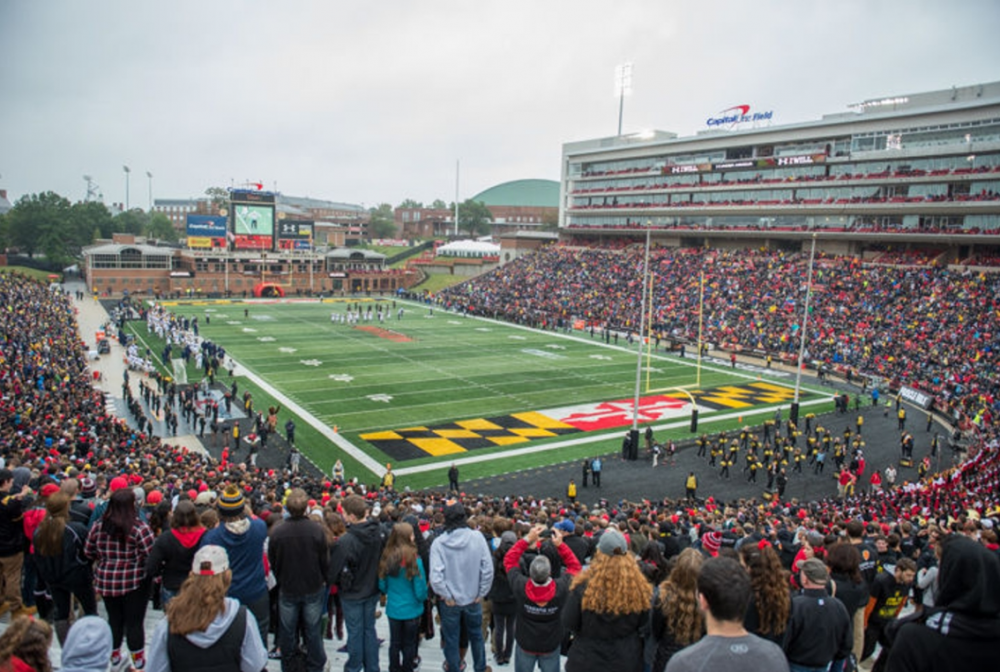By Lexie Schapitl
@lexieschapitl
Senior staff writer
The University of Maryland has agreed to provide additional captioning at athletic events, as well as on the athletic department website, as part of a lawsuit settlement with three deaf Maryland sports fans, according to a university spokesman and attorneys involved with the case.
This university will install an additional “ribbon board,s” a long, skinny LED board designed to display text versions of announcements, at the closed end of Maryland Stadium. The board will be located at the closed end of the stadium opposite of Gossett Football Team House for the 2018 football season, university spokesman Brian Ullmann said.
This university will now caption all videos posted on their websiteand will go back to caption archived videos on the site, Ullmann added.
This university will also continue to provide the captioning it has been providing since 2014, Ullmann said. That year, the university installed ribbon boards to implement captioning of announcements at both Maryland Stadium and Xfinity Center, according to court documents related to the case.
The settlement also included portions of money for the plaintiffs and attorneys’ fees, said Joseph B. Espo, a lawyer with Brown, Goldstein & Levy who represented the plaintiffs. The Board of Public Works approved a request for $315,000 to settle all claims on July 27, according to a meeting transcript.
Ullmann said the university wants to be “completely accommodating to everybody,” and the parties were pleased they could reach an agreement.
“We had the same goal, which is to make the fan experience the best it can be for all of our fans,” Ullmann said. “Because we had the same goal, we could have very productive conversations about how to best get there.”
The National Association of the Deaf filed the lawsuit in the fall of 2013 on behalf of Sean Markel and Joseph Innes, longtime Maryland sports fans who are deaf and had asked the university to provide captioning in Maryland Stadium and Xfinity Center on several occasions, said Caroline Jackson, an attorney with the NAD who also represented the plaintiffs. Danny Rinas, a third plaintiff and basketball season-ticket holder, later became involved in the case, Jackson said.
The suit claimed that the university’s failure to provide captioning violated the Americans with Disabilities Act, which prohibits discrimination based on disability in employment, public accommodations and government activity; and the Rehabilitation Act, which covers entities that receive federal funding, Espo said.
For deaf people, the ADA defines discrimination as “the failure to provide the auxiliary aides and services necessary to ensure effective communication,” Jackson said.
“So if everybody else gets to know who scored the touchdown, then a deaf person has the right to get that information as much as possible on equal footing with other people,” she said.
At the time the NAD filed the suit, captioning was available only on hand-held devices, Jackson said. Individuals could obtain a password to access captioning on their own devices or check out tablets to use, but the plaintiffs in the case were not aware of this service, which was new at the time, she added.
The NAD argued this captioning did not provide effective communication for deaf fans: It used voice recognition software that was often inaccurate, the feed was not timely and the use of hand-held devices made for an “obnoxious experience” at sporting events, Jackson said.
“If you want to have a drink and hold your phone that’s fine, but if you’re deaf and you sign, it means you can’t talk to anybody because you have your drink in one hand and your phone in the other,” she said. “It’s also hard to view your device in bad weather. If it’s too sunny you can’t see it, if it’s raining you can’t have it out, if it’s cold you can’t wear your gloves. It’s heavy. There are all sorts of real inconveniences that make it, on top of the delay and the unreliability of what you’re actually reading, just made it not a real solution.”
The university appears to have “embraced the virtue of captioning and providing equal access for its deaf fans,” Espo said.
“We think that the university is doing the right thing and doing it as quickly as it can,” he said. “[The plaintiffs] go to games regularly and they look at the website regularly and they’re happy at the outcome.”
The estimated cost of installing an additional ribbon board in Maryland Stadium is about $150,000, said Zack Bolno, senior associate athletic director. Providing video captioning at Maryland Stadium, Xfinity Center and on the athletic department website will cost an estimated $35,000 annually, to pay for a caption writer and other expenses, Bolno said.
Jackson said she is “thrilled with the steps that the University of Maryland is taking to make sure that its sports venues and its sports teams, that are so widely popular, are accessible to all of its fans.”
“It’s always a good day when the defendant in a lawsuit says, ‘You know, we want to do the right thing. We don’t want to dig in our heels and continue to insist that what we’re doing is right. We want to take the plaintiffs’ word for it, or we’ve done research and we kind of see how the plaintiff has a point,'” Jackson said.



